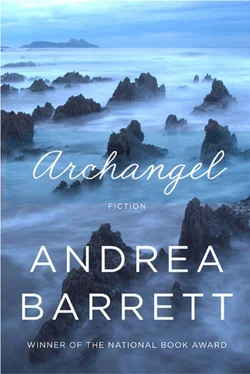The clean white linens glowed against the pine and the windows offered squares of sky through which moved clouds, terns, gulls, geese, ducks, an occasional osprey, and, on the side facing the shore — Henrietta had chosen as her own the fourth bed, equally far from the stairwell and the dressing room — miles of Buzzards Bay. She slept there on the night before the rest of the students arrived, leaving behind the sofa where she’d been camped. The building was so quiet that from her window she could hear the tips of the eelgrass brushing against the sand.

OF THE FIFTY-EIGHT applicants the professor had selected, forty-two arrived on Tuesday, those who canceled — all women, he noted with surprise — apparently frightened off by reports of the unfinished buildings. But that was plenty, the professor thought, a strong group, young teachers themselves, come to be trained by him. Twenty-nine men and thirteen, no fourteen women: he’d forgotten to count Henrietta, who’d been working hard since Saturday and who, at meals, listened to him so attentively. When he pointed out an osprey’s nest or the pattern the mussels formed on the pilings she seemed to register every word, and when she was sharing tasks with his wife she took direction easily, always an excellent sign in a student. Although he was tired, indeed he hadn’t been feeling well for months, the sight of her made him eager to teach again. He had not had a real disciple in years, and the prospect of a young woman, as hungry for knowledge as his own wife had once been: what did he care if the lecture room wasn’t finished? Brilliant sunlight outside, velvet shadow past the threshold; he stepped through the double doors, drawing deep, delighted breaths. He’d taught in tents, on glaciers, on boats, in basements. This was luxury, standing on fragrant new boards with twenty feet of air above him, the cool shade pierced by swallows swooping between the rafters, darting in and out.
The room grew quiet. He knew he was ready. Behind him, on the blackboard hastily mounted to the new wall and concealing the sight but not the sounds or the smells of the cook and her helpers preparing lunch, were the first of the chalk drawings he’d use to lead the students to the truth. He opened his mouth and whole paragraphs leapt smoothly out, one suggesting the next, each familiar but delivered this time in a different order, a different context. The paragraph on the divine order of nature knitted gracefully onto the paragraph about how we could learn more from a single living grasshopper, closely observed, than from twenty dusty books. One paragraph came directly from something he’d written himself: All the facts proclaim aloud the one God, whom man may know, adore, and love; and Natural History must in good time become the analysis of the thoughts of the Creator of the universe, as manifested in the animal and vegetable kingdoms . Another paragraph spoke of the great tradition this school embodied, the lineage of Cuvier and Humboldt passing directly from them to him, on to all his earlier students, and now to those before him. Soon he’d spoken the paragraph of thanks to his supporters, and the paragraphs introducing the other teachers: the six former students, now his friends, middle-aged themselves, responsible for different areas of natural history. Then came the lines in which he instructed the students to stand and introduce themselves.
Two Johns, a Robert, Elias, Oscar, Katherine, Mary, Mary; Josietta, oddly rhyming with Henrietta, whom he liked. A Daphne, a Hazel, a Lily, a Rose, like a clump of flowers. The names flew past. Some taught at public high schools and some at normal schools or colleges, some were in their twenties while others were older — Benjamin, David, Claire — but all looked young to him, skin unmarked and eyes transparent. Later, he knew, the faces crowded around the three long tables and peering up at him would look less like rows of sea anemones. Later, as they asked questions or sat lumpishly mute, demonstrated a deft hand with a scalpel or botched the simplest drawing, he’d be able to distinguish some as individuals. For now they were like variations on a single underlying idea, their differences not uninteresting but in the end slight. Few, perhaps not even Henrietta, really grasped who he was. Some might know his books, others the museum he’d founded; a few might be familiar with his theory of glaciers; most knew he was famous but not exactly why. It was their parents who, a quarter-century ago when he could fill any city’s lecture hall, had really appreciated him and his work. That moment on the boat when Henrietta confided that her mother had been one among the thousands responding to his call for specimens had pleased him, at first, reminding him of those glorious days. Then wounded him with the reminder of his age.
He leaned on his cane as they spoke. His knees hurt, one of his hips, the tips of his toes and his fingers; he was sixty-eight and his digestion was in shreds; he had cataracts in both eyes. Ahead lay weeks of morning lectures, afternoon demonstrations, expeditions, and conversations, day blurring into day and lecture into lecture. The nights would be his reward. On the beach, beneath the stars, near the soft hiss of water striking sand, he and his friends would relax at last, free to remember their own discoveries. The glaciers rolling down, reshaping the landscape; all year he’d been looking forward to these discussions. For now — he opened his mouth and from it poured a summary of the general characteristics of the vertebrates, the mollusks, the articulates, and the radiates.
“Is this division of the animals into four groups,” he concluded, “the invention of a great naturalist? Or is it simply the reading of the Book of Nature? Can the book have more than one reading? If our classifications are not mere invention, if they are not an attempt to classify for our own convenience the objects we study, then they are thoughts which, whether we detect them or not, are expressed in Nature. So then Nature is the work of thought, the production of intelligence, carried out according to plan, therefore premeditated — and in our study of natural objects, we are approaching the thoughts of the Creator, reading his conceptions, interpreting a system that is his and not ours.”
Two swallows darted past as he spoke, headed for the rafters, and half the young people assembled before him looked up.

IN THE FIRST batch of mail for the students, delivered by the same little boat that had brought her to the island, Henrietta had a letter from her mother. After giving the family news, and wondering how Henrietta’s journey had gone and how her boots were holding up, she asked about the professor:
What is he really like? I imagine him sitting down with you individually, showing you the secrets of a turtle’s egg or a minnow, but perhaps I imagine this wrongly and he doesn’t spend that much time with you. Does he lecture, or does he leave that to the other teachers? If you do get to talk to him alone, please tell him how much we treasure his books in our home, and how seriously we in our small village have taken his work. Your father and Hester send love, as do I .
She’d written, Henrietta imagined, with those very books around her, her pen moving briskly while Hester, who had just turned twelve, fussed over the brood of tawny hens she’d raised herself. Already she dreamed of having a big family, while Henrietta had wanted only this. Because of the professor’s books, she’d sailed through the zoology questions on the entrance exam for Oswego: Give the names of the sub-kingdoms of animals. Give briefly the characteristics of each sub-kingdom, speaking particularly of the arrangement of the circulatory, digestive, and nervous systems. What mental and moral powers has the cat? Prove it. Describe your right hand .
Читать дальше













